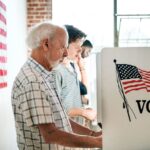Surely, at some point, an accomplished polymath will create Integripedia to provide info-hungry internet users with a comprehensive source on political integrity. Specifically, the compendium should cover the promises and pledges of political leaders as well their foibles and accomplishments and perhaps most memorable statements. For the present, however, we must rely upon Safari, Google, Bing and others to identify such topical information. Worse, we may be relying upon cable news pundits who are no longer characterizing their spiels as journalism.
At the end of April, Virginia’s youngish governor conducted a press conference to discuss his first 100 days in office and parse his administration’s accomplishments. Only a few outlets, rather unenthusiastically, reported upon the signature event. For the most part, the Governor offered that great progress has been made.
A reading of the media coverage confirms that the Governor made no mention of efforts to enhance the Commonwealth’s election integrity, as he promised during his campaign. No mention was made of his legislative amendment to restore integrity to the Loudoun County School Board which, during the campaign, he declared to be guilty of “gross negligence” and “violating the Virginia Constitution.”
Lay folk would likely agree that electoral procedures and processes should be annually administered to ensure the validity and credibility of each and every vote for each and every election. To this end, the proportions or numbers of electoral malfeasance discovered or prosecuted are vital mile posts in identifying soft spots and creating remedial measures.
The Heritage Foundation, a well-respected conservative source, maintains a database (undated) of electoral malfeasance occurrences as “a sampling” of proven instances over several years.
Between 2011 and 2021, Heritage notes a record of 20 cases of proven electoral offenses in Virginia. Only a single instance is cited for the 2020 election, and in that instance an “unabashed conservative” was convicted of a misdemeanor in 2021 on a finding that he cast two votes. Most of the remaining cases involved individuals with felony convictions attempting to vote, which tends to confirm the effectiveness of voting rolls by the state. The sampling is also helpful as it categorizes the types of electoral offense along with details of the cases. For the political voyeur it is fun reading.
By comparison, between 2005 and 2022, a twenty-year span, Texas is recorded with 102 “proven instances.” In either state, the numeric data is not shocking given the millions of votes cast in elections local or national in the reported periods. The Heritage “sampling” enumerates 1,353 “proven instances” with 1,165 “criminal convictions.”
Of course, because Heritage provides only a sampling, actual data may be far greater. The not-for-profit organization caveats its presentation by asserting that its “Election Fraud Data Base” is not “exhaustive or comprehensive.” Still, the data supporting a hair-on-fire conclusion is miniscule.
The electorate of the Commonwealth need not fear that voter rapscallions and wrongdoers will escape detection. Senator Amanda Chase, R-Chesterfield, has been threatening to expose facts of the absence of election integrity in Virginia. She met with Attorney General Jason Miyares in February to present him with material (documents?) demonstrating her claims and, then, made a public presentation in April in Loudoun County. Chase has been cautiously unwilling to share the material more broadly with the public, maintaining that the information is very technical (suggesting untrained lay folk would not understand). The AG’s office indicated that it was evaluating Chase’s submission, while Chase said she would hold a press conference at some later date.
It is significant to note that, according to the Heritage information, a bare attempt to vote in violation of rules is not an offense listed for Virginia, although it might get a violator jail time in Texas. The two failed attempts by the Governor’s son to vote in 2021 were not prosecuted, as they were deemed “no foul, no harm.” Heritage might disagree by the terms of its own characterizations.
In the meantime, the November 2022 elections are but a few months away. Disinformation, misinformation, and the absence of information continue to be propagated and bandied about the stolen 2020 election further exacerbating voter anxieties about election integrity, even as candidates and elected officials mewl from their soapboxes about the existential dangers. By the time Integripedia is available another set of elections will have taken place without some common source available to assess and advise the about miasma about election integrity.
Jim McCarthy is a retired New York City attorney living in Virginia.



